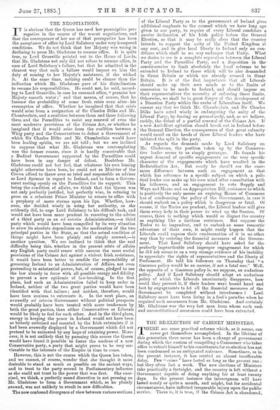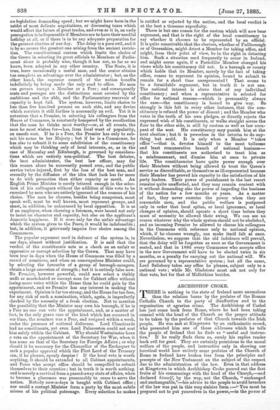THE RE-ELECTION OF CABINET MINISTERS.
THERE are some practical reforms which, as it seems, can never get themselves accomplished. In the lifetime of this generation there never has been a change of government during which the custom of compelling a Commoner who takes office to submit himself to his constituents for re-election has not been condemned as an antiquated nuisance. Sometimes, as in the present instance, it has created an almost insufferable delay. Few " crises " have lasted so long as the present one ; but they often last a week. The new elections of Ministers take practically a fortnight, and the country is left without a Government capable of doing anything for at least twenty days. In the present instance the interregnum will have lasted nearlS, or quite a month, and might, but for accidental circumstances, have inflicted irreparable injury upon the public service. There is, it is true, if the Crimes Act is abandoned, no-legislation demanding speed ; but we might have been in the midst of most delicate negotiations, or discussing taxes which would affect the future of great trades, and even as it is, an early prorogation is indispensable if Members are to have their needful holiday at all, or if there is to be any adequate preparation for the greatest election of our day. The delay is a pure evil, and it is by no means the greatest one arising from the ancient restriction. The constitutional custom which limits the choice of the Crown in selecting its great officials to Members of Parliament alone is probably wise, though it has not, so far as we know, been adopted in any other country. The State, it is true, loses occasionally a useful man, and the orator obtains too complete an advantage over the administrator ; but, on the other hand, the supreme council of the nation benefits indefinitely by being made the only road to office. No man can govern except a Member or a Peer ; and consequently seats and peerages are the distinctions most coveted by the ambitious and the able, and the Parliamentary reservoir of capacity is kept full. The system, however, limits choice to less than five hundred persons on each side, and any device which restricts it still further is necessarily an evil. Yet it is notorious that a Premier, in selecting his colleagues from the House of Commons, is constantly hampered by the recollection that the man he thinks most worthy—or, at all events, the man he most wishes for—has, from local want of popularity, an unsafe seat. If he is a Peer, the Premier has only to submit his name to her Majesty ; but if he is a Commoner, he has also to submit it to some subdivision of the constituency which may be thinking only of local interests, or, as in the case of Macaulay and Edinburgh, is governed by considerations which are entirely non-political. The best debater, the best administrator, the best law officer, may for this reason alone be necessarily passed over, and the public service twice injured, first by the loss of the best man, and secondly by the diffusion of the idea that luck has far more to do with promotion than either capacity or merit. An English Prime Minister is surely fettered enough in the selection of his colleagues without the addition of this veto to be exercised by men who are entirely ignorant of the reasons of his choice. The men he chooses, besides being competent, must speak well, must be well known, must represent groups, and must, in addition, be unharassed by local opposition. It is as if an employer, when choosing a foreman, were bound not only to insist on character and capacity, but also on the applicant's domestic happiness. If it were only for the unfair advantage which the system gives to the Peers, it would be indefensible; but, in addition, it grievously impairs free choice among the Commoners.
The popular argument used in defence of the system is, in our days, almost without justification. It is said that the verdict of the constituents acts as a check on an unfair or oppressive or corrupt selection by the Crown. That may have been true in days when the House of Commons was filled by a crowd of nominees, and when an unscrupulous Minister could, by selecting the favourite of a group of borough-mongers, obtain a large accession of strength ; but it is entirely false now. No Premier, however powerful, could now select a visibly unfit or much-hated or corrupt man for Cabinet office without losing.more votes within the House than he could gain by the appointment, and no Premier has any interest in making the experiment. Opinion is far too strong, and the House far too free, for any risk of such a nomination, which, again, is imperfectly checked by the necessity of a fresh election. Not to mention the possibility that the Minister may own his borough, if he is a Peer no one can veto the appointment, and, as a matter of fact, in the only grave case of the kind which has occurred in our time, the nominee was a Peer, and resigned within a week, under the pressure of national disfavour. Lord Clanricarde had no constituents, yet even Lord Palmerston could not seat him safely within the Cabinet. Why should Westminster have a veto on the appointment of the Secretary for War, when it has none on that of the Secretary for Foreign Affairs ; or why should it be necessary for the Chancellor of the Exchequer to seek a popular approval which the First Lord of the Treasury can, if he pleases, openly despise ? If the local veto is worth anything, it should be extended to all Cabinet appointments, and Peers who accept office should be compelled to submit themselves to their counties ; but in truth it is worth nothing, and is merely a survival from a passed-away state of affairs, when to become a placeman was presumably to cease to serve the nation. Nobody now-a-days is bought with Cabinet office ; nor could a corrupt Minister form a party by the most subtle misuse of his political patronage. Every selection he makes is ratified or rejected by the nation, and the local verdict is at the best a tiresome superfluity. There is but one reason for the custom which will now bear argument, and that is the right of the local constituency to say whether it chooses to be represented by an official. It is quite conceivable that the electors, whether of Fallborough or of Greenehire, might detest a Member for taking office, and might, from their point of view, be in the right in detesting him. Such a situation used frequently to occur in Ireland, and might occur again, if a Parnellite Member changed his views while his constituency did not. Is a borough or county which holds that its Member, merely by the fact of taking office, ceases to represent its opinion, bound to submit to remain for a short time unrepresented ? That seems to be a formidable argument, but in truth it is not one. The national interest is above that of any individual constituency ; and when a representative is selected for office for national reasons—which is presumably always the -case—the constituency is bound to give way. So strongly is this felt in every other instance, that the constituency is refused the power of dissent ; and the Member who votes in the teeth of his own pledges, or directly rejects the expressed wish of his constituents, or walks straight across the floor to the other side, is still by custom as well as law occupant of the seat. His constituency may punish him at the next election ; but it is powerless in the interim to do anything but scold. It is only when a Member "takes office "—that is, devotes himself to the most toilsome and least remunerative branch of national business— that his constituents are authorised to treat him as a misdemeanant, and dismiss him at once to private life. The constituencies have quite power enough over their Members without being allowed to treat the Queen's service as discreditable, or themselves as ill-represented because their Member has proved his capacity to the satisfaction of his party leaders. Their power of punishment in the last resort remains-quite unaffected, and they may remain content with it without demanding also the power of impeding the business of the nation for a few months or years. As a matter of fact, they never exercise the power when they are reasonable men, and the public welfare is postponed only in order that local spites, or local ignorance, or local changes of opinion, should operate a short time before they must of necessity be allowed their swing. We can see no reason whatever why the whole system should not be abolished, and an incoming Premier be allowed to choose his colleagues in the Commons with reference only to national opinion, which, if he chooses wrongly, can make itself felt at once. Nevertheless, we suppose that the old indolence will prevail, that the delay will be forgotten as soon as the Government is seated, and that in 1886 every Commoner who accepts office in the new Government will have to be elected twice in six months, as a penalty for carrying out the national will. We are governed by a representative system ; but all the same, Lord Salisbury takes any office he pleases, subject only to a national vote ; while Mr. Gladstone must ask not only for that vote, but for that of Midlothian besides.



































 Previous page
Previous page